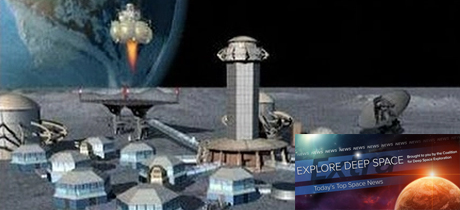In Today’s Deep Space Extra… China finds Russia prepared to cooperate on future missions of lunar exploration.
Human Space Exploration
Orbital ATK motor test proves successful
Deseret News of Utah (6/15): Orbital ATK led a successful ground test firing of the Launch Abort System under development for NASA’s Orion crew exploration spacecraft in the Utah desert on Thursday. The test lasted only a few second but produced data that will require several weeks to fully analyze. The abort system is designed to sit atop Orion during the launch phase and be capable of rapidly pulling the spacecraft and its crew to safety if there is a problem during the ascent of the Space Launch System rocket. During a launch from NASA’s Kennedy Space Center, the capsule with crew would descend under parachute into the Atlantic Ocean for recovery.
NASA shows off its tech on Capitol Hill
The Hill (6/15): NASA technology was on display at Capitol Hill in Washington on Thursday. It was the sixth occasion in which the space agency has sought to present the goals and benefits of space exploration to the lawmakers who assess annual budgets. “I think it’s time in our nation’s history to really push the boundaries again of where our technological capabilities are for space and go ultimately to Mars,” said Chris Cassidy, a U.S. Navy SEAL and astronaut, who was among those in the capitol for the presentation.
Russian Progress MS-06 resupply ship to dock at ISS on Friday
Sputnik International (6/16): Russia’s Progress MS-06 cargo mission spacecraft was on track to carry out an automated docking with the International Space Station on Friday at 7:42 a.m., EDT. The spacecraft was launched from Kazakhstan early Wednesday with three tons of propellant, food, crew supplies, science equipment and small satellites that are to be released during an August spacewalk.
Space Science
5 health care developments that were born in space
Mashable (6/15): Among the dividends from U.S. human space exploration are advances in health care, including robotic surgery and countermeasures for asthma and osteoporosis.
Russian aerospace firm to cooperate with China on Lunar exploration missions
Moon Daily (6/13): Russia proclaims itself ready to join with China in the future exploration of the moon. The two countries have lunar missions in planning stages with similar objectives, according to Xu Yansong, head of the International Cooperation Department of the China National Space Administration. A lunar sample return mission is in the mix.
Other News
Senate-passed sanctions bill includes exception for NASA, commercial space launches
Spacepolicyonline.com (6/15): A U.S. Senate Russia/Iran sanctions measure passed on Thursday specifies an exemption: Launch service providers may loft NASA and commercial payloads on rockets using Russian rocket engines.
Planetary Resources sets aside Earth observation system
Space News (6/15): Redmond, Wash., based Planetary Resources has diminished plans for an Earth observing satellite constellation in order to focus a higher priority on asteroid prospecting. Chris Lewicki, Planetary Resources president, discussed the company planning at a meeting this week of NASA’s Small Bodies Assessment Group.
China’s cargo spacecraft completes second in-orbit refueling
Xinhuanet of China (6/15): China’s Tianzhou-1 cargo spacecraft and orbiting Tiangong-2 space lab carried out a second refueling demonstration during a mission that began with an April 22 liftoff. The refueling session is part of plans by China to assemble an independent space station.
Russian rocket sparks deadly fire: How it happened
Space.com (6/15): Falling pieces of the Soyuz 2a-1 rocket that launched Russia’s Progress MS-06 cargo mission to the International Space Station early Wednesday sparked a fire 375 miles from the Baikonur Cosmodrome launch complex in Kazakhstan. Flames at the drop sight killed one worker attempting to extinguish the flames and injured another.
Russian institute to start long-haul Mars mission simulations in November
Sputnik International (6/16): Russia’s Institute of Biomedical Problems plans to initiate a series of human interplanetary mission simulations starting in November. The exercises will include a half dozen men and women of different nationalities in isolated conditions. The series of studies will last from 14 days to one year and include research that ranges from leadership issues to immune system changes.

